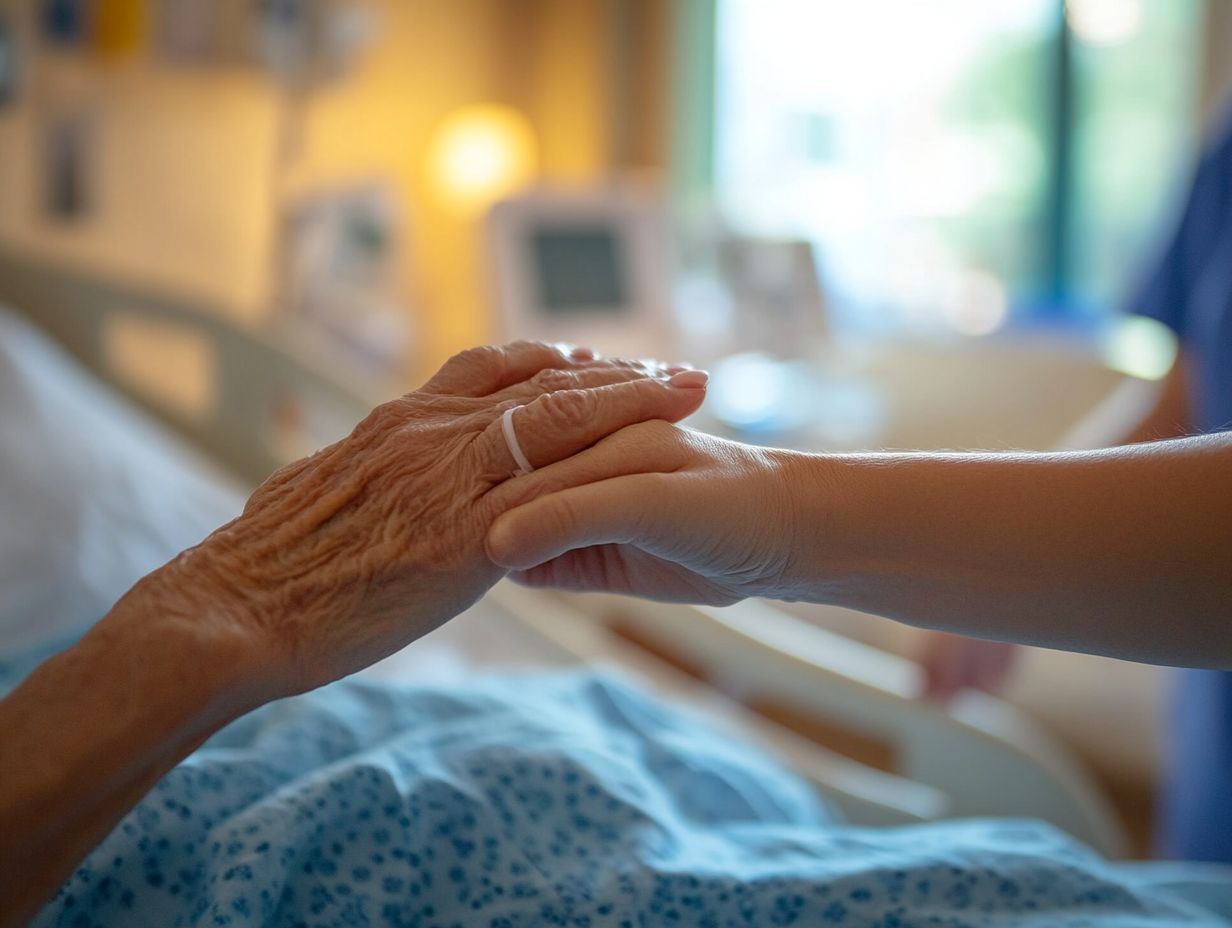Nurses play a pivotal role in cancer support by providing comprehensive care that addresses both the physical and emotional needs of patients. Cancer’s impact extends beyond patients to their families, causing emotional distress and significantly altering quality of life. Oncology nurses are at the forefront of this support system, offering treatments, patient education, and psychological assistance to enhance patient outcomes and quality of life.
These caregivers collaborate closely with healthcare professionals as part of a multidisciplinary team, ensuring a coordinated approach to treatment and patient well-being. Their responsibilities include:
- Assessing patient conditions and monitoring for adverse events
- Administering medications, including chemotherapy
- Providing guidance on lifestyle adjustments and nutritional management
Despite the emotional challenges inherent in their role, oncology nurses find fulfillment in helping others, building strong patient relationships, and contributing to life-saving care through patient-centered care, making it a deeply rewarding career.
Key Takeaways:
The Impact of Cancer on Patients and Families

Cancer impacts patients and families by causing significant emotional distress and altering quality of life, emphasizing the need for supportive care and effective communication skills.
Patients experience physical challenges, emotional distress, and uncertainty about health outcomes.
Families face the burden of providing support and coping with their own emotions and role changes.
Addressing these impacts requires comprehensive patient-centered care and holistic approaches, including palliative care for advanced cancer stages.
Understanding the Emotional and Practical Challenges
Understanding the emotional and practical challenges faced by cancer patients is essential for effective supportive care and outcome improvement.
Cancer patients often experience anxiety and depression due to their diagnosis and treatment process.
Managing appointments, medications, and treatment schedules adds practical stress.
Emotional support systems are vital for fostering resilience and providing encouragement.
Recognizing these challenges allows caregivers and healthcare providers to enhance the care experience for cancer patients.
The Role of Nurses in Cancer Care
Oncology nurses are primary caregivers in cancer care, providing medical and emotional support to patients, addressing patient needs comprehensively.
Oncology nurses administer treatments, educate patients, and offer psychological support.
Oncology nurses collaborate with oncologists, dietitians, pharmacists, and other healthcare professionals to ensure comprehensive patient care through interprofessional collaboration.
Oncology nurses play a crucial role in improving patients’ quality of life during cancer treatment, advocating for patient needs and support throughout the patient journey.
Providing Physical and Emotional Support
Oncology nurses provide physical and emotional support, which is essential for patient outcomes and quality of life during cancer treatment, employing empathy and effective communication skills.
Support includes building trust, encouraging open dialogue, and addressing both physical symptoms and emotional well-being.
Training in empathy and communication equips nurses to offer holistic care that integrates emotional and physical health.
Collaborating with Other Healthcare Professionals

Collaboration with healthcare professionals is crucial for oncology nurses to provide comprehensive cancer care, ensuring coordinated care strategies and patient advocacy.
Oncology nurses work with oncologists, pharmacists, social workers, and nutritionists to deliver coordinated and holistic patient care.
Team members contribute expertise in treatment planning, medication management, emotional support, nutrition, and cancer therapeutics, enhancing patient recovery and well-being.
Effective communication within this team allows for adaptable care strategies that enable patients.
Specific Responsibilities of Nurses in Cancer Care
Nurses in cancer care monitor patients for adverse events, manage symptoms related to cancer and its treatments, and provide education on treatment options and lifestyle adjustments, facilitating patient empowerment.
Nurses ensure patients adhere to treatment plans and offer emotional support. Nurses facilitate communication between patients and the healthcare team, playing a pivotal role in care coordination.
Assessing and Monitoring Patients
Assessing and monitoring patients involve evaluating physical and emotional conditions to ensure effective treatment and safety in oncology care.
Oncology nurses use patient assessment techniques to identify complications and adjust treatment plans, ensuring safety and efficacy in cancer care.
Monitoring vital signs like heart rate, blood pressure, and temperature helps detect distress or adverse reactions early, enabling timely interventions.
Recognizing symptoms such as pain, fatigue, and nausea allows timely interventions for patient comfort.
Administering Treatments and Medications
Oncology nurses administer treatments and medications, including chemotherapy.
Administering these requires precise dosage calculations and strict adherence to protocols for patient safety.
Oncology nurses monitor patients for adverse events and educate patients about treatment options to support well-considered choices, promoting informed decision-making.
Nurses enhance treatment experiences by enableing patients with knowledge and encouraging adherence to therapies.
Educating Patients and Families

Oncology nurses educate patients and families about cancer diagnoses, treatment options, and coping skills.
Education helps patients understand their condition, adhere to treatment, and manage side effects.
Oncology nurses provide emotional support to reduce anxiety and stress.
Challenges and Rewards of Being a Cancer Nurse
Cancer nurses face challenges such as emotional strain, exposure to patient suffering, and the need for constant emotional resilience.
Rewards of being a cancer nurse include building strong patient relationships, witnessing patient recovery, and contributing to life-saving care.
These factors together create a demanding yet deeply rewarding career.
Dealing with Emotional Strain and Burnout
Oncology nurses face emotional strain and burnout due to exposure to patient suffering.
Dealing with emotional strain requires strong support systems at work and home.
Coping strategies include mindfulness, exercise, and professional counseling.
Oncology nurses can maintain resilience through self-care and mentorship programs.
Finding Fulfillment in Helping Others
Finding fulfillment in helping others is a key motivator for oncology nurses, who focus on improving patients’ quality of life.
Oncology nurses find purpose through daily interactions and empathy, connecting deeply with patients undergoing cancer treatment.
With nursing education, these professionals provide medical support and emotional comfort.
Oncology nurses advocate for patient awareness, education, and resources, promoting enablement and understanding, particularly in advanced cancer cases.
Frequently Asked Questions

What is the role of nurses in providing cancer support?
Nurses play a crucial role in supporting cancer patients throughout their journey, providing physical, emotional, and psychological care. They are responsible for coordinating treatment plans, managing symptoms, and educating patients and their families about the disease.
How do nurses support cancer patients during treatment?
Nurses administer medications, monitor vital signs, and provide wound care to ensure patients are comfortable during treatment. They also collaborate with other healthcare professionals to develop personalized care plans and provide support and guidance during difficult procedures.
What kind of emotional support do nurses offer to cancer patients?
Nurses are trained to provide emotional support and counseling to help patients cope with the stress and anxiety of a cancer diagnosis. They listen to patients’ concerns, offer reassurance and encouragement, and connect them with support groups and resources in their community.
How do nurses help cancer patients manage side effects of treatment?
Nurses closely monitor patients for any side effects of cancer treatment and provide interventions to manage them. This can include administering medications, suggesting lifestyle changes, and providing emotional support to help patients cope with the physical and emotional effects of treatment.
What role do nurses play in educating cancer patients and their families?
Nurses are responsible for educating patients and their families about their diagnosis, treatment options, and strategies for managing symptoms at home. They also provide information about potential side effects and how to recognize and report them, as well as offer resources for additional support.
How do nurses continue to support cancer patients after treatment?
Even after treatment, nurses play a crucial role in supporting cancer patients. They monitor for any recurrence of the disease, provide follow-up care and education, and provide continued emotional support to help patients adjust to life after cancer. Nurses also connect patients with survivorship programs and resources to help them thrive in their survivorship journey.





